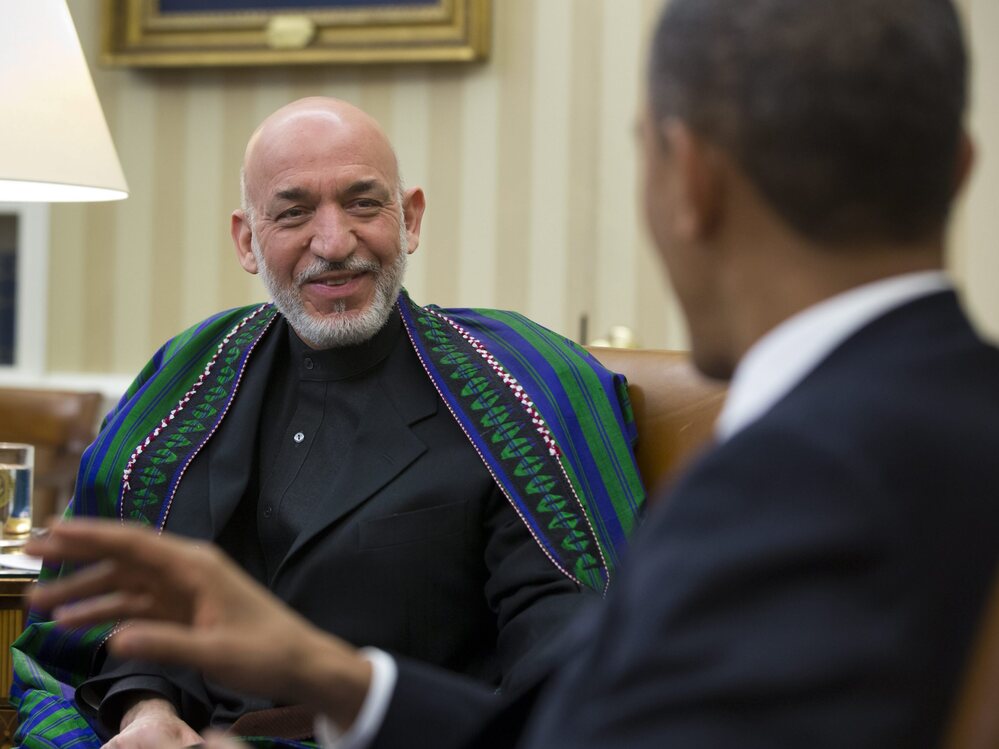Afghan President Hamid Karzai smiled as President Obama gestured earlier today in the Oval Office.
Afghan President Hamid Karzai smiled as President Obama gestured earlier today in the Oval Office.
Jim Lo Scalzo /EPA /LANDOVThe issue many Americans will want to hear about this afternoon when President Obama and Afghan President Hamid Karzai take questions from reporters at the White House is how many U.S. military personnel will be staying in Afghanistan after 2014, when the U.S. combat mission there is set to end.
As The Associated Press writes:
"U.S. commanders in Afghanistan have proposed keeping 6,000 to 15,000 U.S. troops after 2014 to continuing pursuing terrorists and training Afghan security forces. But the White House, which tends to favor lower troop levels than the generals do, says Obama would be open to pulling all U.S. forces out of Afghanistan at the end of 2014."
NPR Pentagon correspondent Tom Bowman put it this way Thursday: American military officials think around 6,000 U.S. troops will remain in Afghanistan after 2014, but White House officials are "looking to keep the numbers lower than the generals." One important factor: the high cost of operations â€" more than $600 billion in the past decade and $100 billion this year alone â€" in Afghanistan.
The two leaders are scheduled to begin their joint news conference at 1:15 p.m. ET. It will be streamed by the White House. We'll update this post with highlights. Later today, NPR's Jackie Northam is due to have more on the Obama-Karzai meeting during All Things Considered. Click here to find an NPR station that broadcasts or streams the show.
Update at 1:10 p.m. ET. Joint Statement.
The White House just released a joint statement from the leaders. It does not specifically address U.S. troop levels. Here's the relevant section:
"During their meetings, the Presidents welcomed recent improvements in Afghanistan's security environment. The Leaders welcomed Afghan security forces' increasing assumption of lead responsibility, noting the marked progress made in the growth and capabilities of the Afghan National Security Forces (ANSF). Exceeding initial expectations, Afghan forces began leading the majority of operations in July 2012 and now lead approximately 80% of operations. In February, in conjunction with the fourth tranche of transition, the ANSF is expected to have the lead in securing nearly 90% of the Afghan population.
"Consistent with Afghan priorities, Leaders at the Chicago Summit committed to mark a milestone in mid-2013 when the ISAF mission would shift from combat to support. President Obama welcomed President Karzai's desire to mark this milestone this spring, when the ANSF are expected to assume the operational lead across Afghanistan, and ISAF will move into an advisor-support role. This milestone would coincide with announcing the fifth and final tranche of transition, which would commence implementation in the summer, subject to final NATO and Afghan approval.
"At the time of the milestone, most unilateral U.S. combat operations should end, with U.S. forces pulling back their patrols from Afghan villages. Both Leaders recognized that, as the Afghan security forces take greater responsibility for security, improving the quality of the ANSF, including the accelerated provision of appropriate equipment and enablers, remains a key priority.
"Building upon significant progress in 2012 to transfer responsibility for detentions to the Afghan Government, the Presidents committed to placing Afghan detainees under the sovereignty and control of Afghanistan, while also ensuring that dangerous fighters remain off the battlefield. President Obama reaffirmed that the United States continues to provide assistance to the Afghan detention system. The two Presidents also reaffirmed their mutual commitment to the lawful and humane treatment of detainees, and their intention to ensure proper security arrangements for the protection of Afghan, U.S., and coalition forces."




